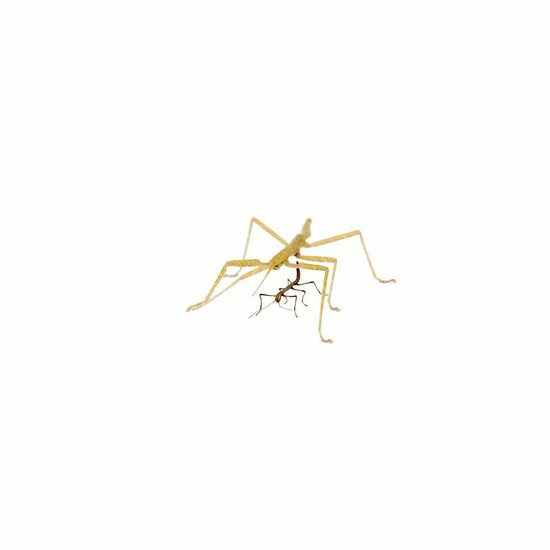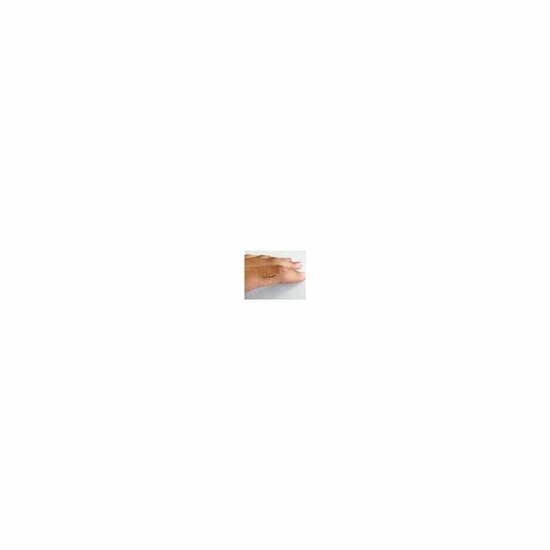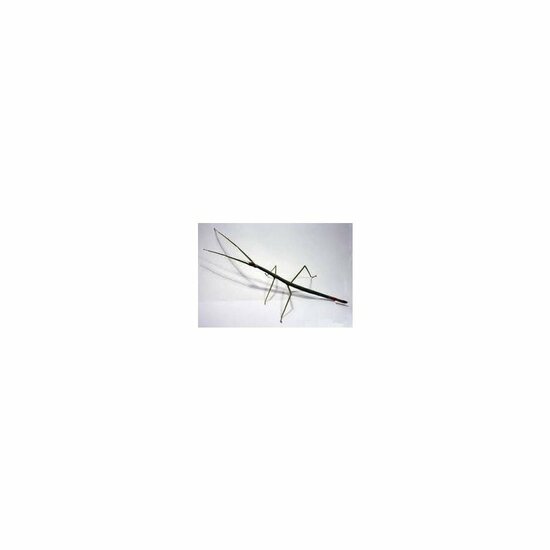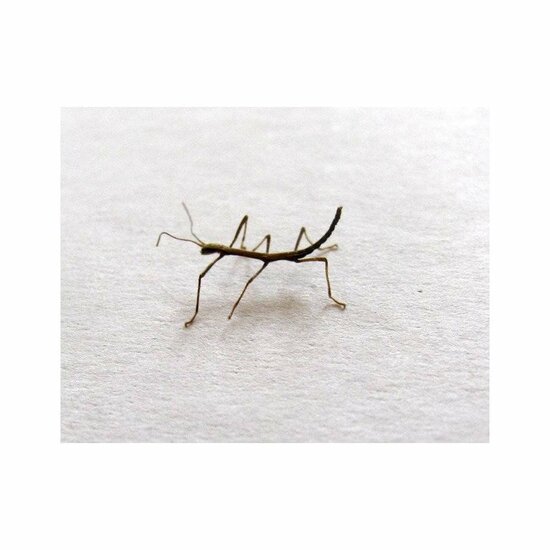







- Ants as pets since 2009 It starts here!
- We ship every working day until 4:30 PM
- Flat shipping costs from €6.99
- Specialists in ants, free advice
Do you have questions about this product?
Or do you need help? Please feel free to contact us, we are happy to help!
Product description
Nymph Indian Stick insect
Offer
1 nymph Indian stick insect, age from L1.
General info
The Indian stick insect is also called the laboratory stick insect and is the most commonly kept species of stick insect in the world. The species has also been given a PSG number, PSG 1. The official Latin name is Carausius morosus.
Most people also start with this species when they first start keeping stick insects. They are easy to keep and eat readily available food, namely ivy.
Movement and behavior
An Indian stick insect is a quiet animal. Because most stick insects are nocturnal, they will not show much movement during the day. However, in the evening you can see them moving and eating. They cannot bite, scratch or excrete poison and are easy to handle. They also cannot jump or fly.
Power supply
This species eats many types of leaves. They are known for eating ivy. They can live on all kinds of ivy and they don't need other leaves to be healthy. You can feed them many other leaves, such as blackberry, raspberry, oak, rose, hazel and privet leaves. Bramble leaves and ivy can always be found in winter.
Plants from stores have been sprayed with insecticides! This will kill your stick insects immediately.
Environmental requirements
The temperature may vary between 18 °C and 30 °C. Room temperature is therefore fine for these animals.
The stick insect does not make high demands on humidity, sprinkling the enclosure twice a week as a basis is sufficient, watch out for mold development. They are also allowed to have some drinking water.
As with all stick insect species, the species requires an enclosure at least 3x the length of the animal in height, and at least 2x the length of the animal in width. For an adult female this means a size of at least 24 cm high and 16 cm wide.
Reproduction
This species is parthenogenetic in culture. This means that in captivity there are only females, and the eggs they lay still hatch without a male having been present. Once again, only females hatch from those eggs.
When the females are mature, they will start laying eggs. The eggs are round and brown and have a small cap from which the nymph will hatch later. They just throw them on the ground. The eggs hatch after a few months.
Home-grown
The nymphs all come from our own breeding and are well cared for before shipping (by parcel post).
Nymph Indian Stick insect
Offer
1 nymph Indian stick insect, age from L1.
General info
The Indian stick insect is also called the laboratory stick insect and is the most commonly kept species of stick insect in the world. The species has also been given a PSG number, PSG 1. The official Latin name is Carausius morosus.
Most people also start with this species when they first start keeping stick insects. They are easy to keep and eat readily available food, namely ivy.
Movement and behavior
An Indian stick insect is a quiet animal. Because most stick insects are nocturnal, they will not show much movement during the day. However, in the evening you can see them moving and eating. They cannot bite, scratch or excrete poison and are easy to handle. They also cannot jump or fly.
Power supply
This species eats many types of leaves. They are known for eating ivy. They can live on all kinds of ivy and they don't need other leaves to be healthy. You can feed them many other leaves, such as blackberry, raspberry, oak, rose, hazel and privet leaves. Bramble leaves and ivy can always be found in winter.
Plants from stores have been sprayed with insecticides! This will kill your stick insects immediately.
Environmental requirements
The temperature may vary between 18 °C and 30 °C. Room temperature is therefore fine for these animals.
The stick insect does not make high demands on humidity, sprinkling the enclosure twice a week as a basis is sufficient, watch out for mold development. They are also allowed to have some drinking water.
As with all stick insect species, the species requires an enclosure at least 3x the length of the animal in height, and at least 2x the length of the animal in width. For an adult female this means a size of at least 24 cm high and 16 cm wide.
Reproduction
This species is parthenogenetic in culture. This means that in captivity there are only females, and the eggs they lay still hatch without a male having been present. Once again, only females hatch from those eggs.
When the females are mature, they will start laying eggs. The eggs are round and brown and have a small cap from which the nymph will hatch later. They just throw them on the ground. The eggs hatch after a few months.
Home-grown
The nymphs all come from our own breeding and are well cared for before shipping (by parcel post).

Write a review about this product.
Reviews
View all reviews from our customers below
Mijn kinderen vinden het heel leuk deze takjes
Arrived fast and safe. She loves to move around and play hide and seek.
More information...
If you have any questions, please don't hesitate to contact us, we like it! You can reach us via email and WhatsApp. You are welcome in the showroom by appointment for advice and purchase!
Customer service Make an appointment
